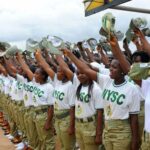Let me tell you my story. A day before the senatorial election in 1983, I decided to take a weekend retreat in a village along the Kaduna-Makurdi road because I found myself contending with the onset of depression over the conduct of the general elections that year – the first after the military kindly invited the civilians back to the stage in October 1979. I was editor of the New Nigerian.
My friend, Isyaku Ilyasu, was going home to Zonkwa. He persuaded me to join him. I did. He dropped me off at a new government-funded hotel about 30 minutes’ drive from Zonkwa. The next day, he visited me in the hotel and told me this story. After dinner the previous evening he visited his friend. He found his little boy alone in the compound. Curious, he asked the boy where his father was. The boy told him he and his mother were in his father’s room.
“What are they doing?” he asked.
Innocently, the boy answered, “They are voting.”
Isyaku burst into the room and found the couple busy thumb printing the ballot papers for the next day’s senatorial election. They were voting for the NPN candidate. My friend berated them. He must have been amused when his friend gave him 20 ballot booklets, each containing 50 ballot papers and requested him to go and help him thumb print and return them to him first thing in the morning.
Isyaku did not oblige him. Instead he brought the exhibits to show me what we knew but had not seen up to that point. When the voters turned up the next day to perform their important civic duty, only a handful of them managed to vote. The rest were told, after waiting for hours in the queue, that the ballot papers were in short supply. They were criminally disenfranchised.
In his inaugural speech as head of state in January 1984, after the sacking of the Shagari regime on December 31, 1983, Major-General Muhammadu Buhari made two important points about election rigging and the unhealthy conduct of the politicians in the struggle for power in the year under discussion.
On election rigging, he said, “The only political parties that could complain of election rigging are those parties that lacked the resources to rig. There is ample evidence that rigging and thuggery were relative to resources available to the parties.” True.
On the attitude of the politicians, he said, “The premium on political power became so exceedingly high that political contestants regarded victory at elections as a matter of life and death struggle and were determined to capture or retain power by all means.” True.
It has been 34 years since he made those statements. I am not throwing them in his face but to make the point that the past has a bad habit of of being a cruel reminder of itself. It is interesting too that 34 years after he criticised the politicians for not playing by the rules, Buhari is conducting his first general elections as president. He is a candidate too, seeking re-election. I am sure he must know by now something about what was wrong in 1983. We wait to see how the war would be prosecuted under his watch.
But from what I can see, nothing changed before his watch; and nothing has changed under his watch. In politics things change slowly or not at all. Our elections are still haunted by the two monsters of rigging and violence. They cast an ominous shadow over every election. And voting, which is a simple civic duty carried out by the citizens to have a say in who leads them, is still a war of the power seekers, necessitating the militarisation of our elections.
In the Ekiti and Osun governorship elections, for instance, 30,000 police personnel were deployed to the states, not just to sufficiently frighten potential trouble makers but more importantly to underline the fact that the Nigerian state is a force in the war of the power seekers.
Election rigging has enjoyed years of successful marginalisation of the Nigerian electorate. Otunba Gbenga Daniel, former governor of Ogun State, once told us as a Newswatch interview team that in his preparation for the election, he funded a study into election rigging in the country. The study turned up, according to him, a big surprise: 22 methods of election rigging. He did not tell us what they were. But we knew about ballot box stuffing, ballot box snatching, and the deliberate refusal to provide enough ballot papers to the strong hold of rival parties.
During Abacha’s transition programme, I once saw the result sheets of a local government election in Benue State. The results were written in figures and words. In several instances, the result sheets showed something like this: two hundred in words but rendered as 2,000 in figures. Only the results in figures mattered. Now, we have the resurgence of an old rigging method: vote-buying. Votes have always been sold and bought in all elections since 1979. It is a reflection of how much the power seekers are willing to exploit the ignorance and the poverty of the electorate. Pox on them.
The surprise is not that there is brazen election rigging carried out with so much criminal-minded boldness and impunity but that while we complain about it, no one has done anything to at least reduce its incidence and make our elections civilised and civic-minded games, not wars in which opponents must not just be defeated but crushed at all costs. Power is not just the ultimate aphrodisiac; it is also the ultimate inebriation. (To be concluded)
 Join Daily Trust WhatsApp Community For Quick Access To News and Happenings Around You.
Join Daily Trust WhatsApp Community For Quick Access To News and Happenings Around You.


